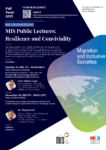MIS Public Lectures: Resilience and Conviviality
We will access this field by distinguishing two different and, in a sense, complementary perspectives. The first sees migration as linked with crisis and vulnerability, the second sees it as linked with diversity and cultural difference. The public lectures will focus on recent debates revolving around two concepts that epitomize these parallel approaches: resilience and conviviality.
17:00h – 18:30h (CEST)
Canada Research Chair in Child, Family and Community Resilience
Director, Resilience Research Centre
Dalhousie University, Canada
Please download the poster here.
| Please note that this event is organised as a covid-free event. This means that: access to this event will be restricted to those who have been vaccinated, recovered or tested negative (self-testing on the spot or certified negative test) you will need the EU Digital Covid-Certificate (EU DCC) (digital or paper version) to prove your “covid-status” if you cannot provide one of the above, you will need to do a rapid test at the entrance of the event (this might take up to 15 minutes, so please arrive early |

17:00h – 18:30h (CET)
Contesting conviviality: Conceptual, political, and epistemological explorations about a troubling wor(l)d
Iberian and Latin American Department of the Historical Institute
Maria Sybilla Merian Center Conviviality-Inequality in Latin America
University of Cologne
Please download the poster here.
| Please note that this event is organised as a covid-free event. This means that: access to this event will be restricted to those who have been vaccinated, recovered or tested negative (self-testing on the spot or certified negative test) you will need the EU Digital Covid-Certificate (EU DCC) (digital or paper version) to prove your “covid-status” if you cannot provide one of the above, you will need to do a rapid test at the entrance of the event (this might take up to 15 minutes, so please arrive early |


MIS organises second UL-wide migration-researchers assembly
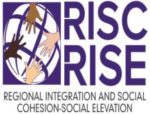
2021 International Conference of the Consortium for Comparative Research on Regional Integration and Social Cohesion-Social Elevation (RISC-RISE):
Social Partnerships and Regional Integration
Organized by the University of Luxembourg, the Luxembourg Institute of Socio-Economic Research, and the University of Johannesburg’s Department of Politics and International Relations
November 29 – November 30, 2021
Campus Belval
Dr. Christian Wille and Dr. Koku Nonoa of MIS will coordinate and chair Panel VII: Spatial and social convergences in border regions through civic engagement on comparative border and migration politics.
Conference format: Health restrictions permitting, the conference will be held in hybrid form with both in- person and remote presentations. The conference will include panels organized by the RISC-RISE consortium’s working groups (4 speakers per panel) and keynote speakers.

Virtual Exhibition Exploring Notions of Home @ IMISCOE 2021
The exhibition has been created by students of the Master in “Learning and Communication in Multilingual and Multicultural Contexts”at the University of Luxembourg.
As part of a course on ‘Creating and analysing visual data’ we explored notions of home and how students, their family and friends relate to this concept visually. Our exhibition shows the complexity of what ‘home’ means to us and the people with whom we connect. It gives a glimpse of who we are ∞ multilingual and diverse ∞, but, more importantly, it tells stories about what we all have in common.
Enjoy our exhibition! We hope you will feel ‘at home’.

Flucht – Grenze – Integration / Fuga – Confine – Integrazione
Beiträge zum Phänomen der Deplatzierung / Contributi al fenomeno dello spostamento
Book publication on the 2017-2019 Villa Vigoni collaboration project
Heimböckel, Dieter / Roelens, Nathalie / Wille, Christian (eds.) (2020): Flucht – Grenze – Integration / Fuga – Confine – Integrazione. Beiträge zum Phänomen der Deplatzierung / Contributi al fenomeno dello spostamento.(Interkulturalität. Studien zu Sprache, Literatur und Gesellschaft, Bd. 19), Bielefeld, Transcript Publishing
January 5, 2021, 240 pages, ISBN: 978-3-8376-5117-1
Wo und wie ereignen sich Grenzen? Inwiefern werden Migrant*innen zu Teilnehmer*innen von Regulierungspraktiken instrumentalisiert und in welcher Form werden damit auch Fragen der Integration berührt? Unter diesen Aspekten setzen sich die Beiträger*innen dieses italienisch- und deutschsprachigen Bandes mit dem Verhältnis von Flucht, Grenze und Integration in literatur- und kulturwissenschaftlicher sowie räumlich-geographischer Perspektive auseinander. Ziel ist es, die Momente von Flucht, Grenze und Integration in ein produktives Spannungsverhältnis zu bringen und als eine von Phänomenen der Deplatzierung zusammengehaltene Trias zu diskutieren.

MIS organised first UL-wide migration-researchers assembly – Thank you for attending!
To get to know each other, we would like to invite you all to put together one slide about you and (one of) your project(s), which you can email us in advance (nicole.holzapfel-mantin@uni.lu) or share with us during the assembly. If you have any further questions, please feel free to contact nicole.holzapfel-mantin at uni.lu.
Please share!

MIS-Funding 2021: Call for projects now closed – submitted projects under review – Thank you for your submissions
MIS would like to continue supporting migration-related research, teaching, and outreach at the FHSE. To that purpose, we have dedicated € 10 000 from our annual budget for 2021 to fund specific projects
More information:
Submission deadline: March 15, 2021
Topics: Research pertaining to migration and inclusive societies (please see “scope” below)
Project duration: Until December 31, 2021
Funded by: MIS – Migration and Inclusive Societies (FHSE)
Contact: till.dembeck@uni.lu or nicole.holzapfel-mantin@uni.lu
Budget: € 10 000 total; max. € 3000 per project
Eligibility
This call is open to all researchers at the FHSE who conduct research pertaining to migration and inclusive societies. While projects of PhD-students can be funded, the salary of PhD-students cannot be funded. It is possible to apply for a project as a group; in this case, one member of the group must be designated as the contact person to MIS or the Principal Investigator (PI). Groups may also include researchers from other Faculties or Interdisciplinary Centers of the University as well as Luxembourg Institutes, but in this case, the designated contact person or the PI must be a member of FHSE.
Scope
MIS invites proposals for research projects on the broader topic of migration and inclusive societies.
Successful project proposals will be teaching, outreach, and/or research oriented and must align with:
- at least 1 of the 5 Working Areas:
- Socio-Economic Participation & Global Connectivity
- Diversity & Social Cohesion
- Cross-Border Movement & Citizenship
- Multilingualism & Educational Challenges
- Experiences of Borders & Cultural Identities
- the MIS-Mission-statement:
The Key Research Area “Migration and Inclusive Societies” (MIS) at the FHSE (https://mis.uni.lu/en) conducts inter- and cross-disciplinary research, teaching and outreach in migration studies with the aim of promoting inclusive societies. Its activities include all aspects of life and borders, thereby going beyond addressing migration with purely economic or political questions. By fostering disciplinary and methodological diversity, MIS engages with the complexity of migration processes and of inclusion.
How to apply
- Please submit an application with a summary of your proposed project (500 words excluding references) to nicole.holzapfel-mantin@uni.lu by March 15, 2021
- In the application please state:
- The project title (at least preliminary)
- The objectives and expected results of your project
- Who is involved in your project (individual and group-applications are possible)
- how your project relates to at least one of the five MIS-working areas and the MIS-Mission-Statement
- how much funding you are applying for and why
- on what purposes you would want to spend the project-money
- Please note that all project-expenses have to be in line with UL financial guidelines
- a timetable of the course of your proposed project
The MIS-Consortium will review your application and results will be communicated via email by March 31, 2021.
Successful projects will be asked to:
- display the MIS-logo on all related material (posters, publications etc.) and acknowledge MIS-support in any other appropriate manner.
- open all related events to MIS-members
- present at MIS-events
- provide a written final report (500 words; including project title, use of funding, outcomes) after the funding period/project has ended, which may be put on the MIS-website; a report-template will be sent out

7th UniGR-CBS Seminar – Border Literature
Organized by the organized by the Université de Lorraine
May 20 & 21, 2021 online (via zoom)
The objective of the seminar is to explore the ways in which the border is written and represented in literature. In what way does literary creation constitute a means of access to the ideality of places, to the imaginary of territory, to the border paradigm?
Please register here.
Download the progamme in German and French.
The seminar is part of the UniGR-CBS thematic focus “Language – Culture – Identity”. It deals with issues in the humanities and social sciences which grapple with the social negotiation of borders and divergences in everyday life, in the field of aesthetics and in migration contexts.

2021 International Conference of the Consortium for Comparative Research on Regional Integration and Social Cohesion-Social Elevation (RISC-RISE):
Social Partnerships and Regional Integration
Organized by the University of Luxembourg, the Luxembourg Institute of Socio-Economic Research, and the University of Johannesburg’s Department of Politics and International Relations
November 29 – November 30, 2021
Campus Belval
Call for Papers open – Deadline May 20, 2021
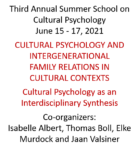
3rd Annual Summer School on Cultural Psychology
Workload: Pre-reading: approx. 15 hours plus Poster preparation
Deadline Poster submission: 10.06.2021*
ECTS points: 2
Where: Hybrid
Participants: Interested UL-PhD students and international participants of all junior academic levels
Costs: FREE!
Registration: UL-Students of the University of Luxembourg can register via Moodle.
External students: Please e-mail sanda.cuturic at uni.lu
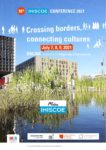
IMISCOE 2021 Conference Crossing Borders, Connecting Cultures
July 7, 8, 9, 2021
ONLINE, hosted by the FHSE
More Info
Borders are vital features of our life, and bordering processes a substantial part of how we negotiate territory, access to space, goods, social status and belonging; in other words, our relationships to others and the environment in which we live.
Focusing on migration and the movement of people in and across time, space and social orders, sharpens our understanding of the complexity of borders, why they exist, to whom they matter and what it takes to perceive, navigate, cross or circumvent them. These navigations can look very different for people with specific backgrounds, pertaining to language, culture, race and, importantly, passport.
Previous conferences have looked into migration, the political, economic forces driving it, the ways it is patterned, administered and controlled by state border regimes, and the consequences migration has created for people who move and societies accommodating people on the move.
Following this line of enquiry, this conference proposes to zoom deeper into the migration experience of people by foregrounding how migration is being connected to culture. We suggest exploring the nexus of migration and culture in more depth asking how migration is lived, experienced, reflected in, and mediated, in particular, through cultural and artistic practice. We seek to investigate this lens as a way to deepen our understanding of the complexity and difference of migration experience , on the one hand, and the possibilities of connecting different migrant experiences and groups of people , on the other.
Luxembourg seems an ideal place to frame such a reflection. Being itself very small, Luxembourg benefits from an economic mobility that is particularly high and diverse. More than half of the population are of second or third generation migrant background, reflecting the country’s past as a key player in the coal and steel industry. The country’s more recent success as a capital in finance and banking, and as an important political player promoting the European Union and running some of its major institutions has attracted a large number of a highly educated work force.
Situated at the heart of the Greater Region, including Luxembourg, France, Belgium and Germany, more than 180.000 people are crossing national borders with Luxembourg daily for work. While Luxembourg is, no doubt, a hub of mobility, the forms and experiences of mobility do vary greatly depending on the conditions of work and life.
This scenario allows us to understand some important issues in more depth:
✓ How are people involved in different forms of mobility (cross border workers, Luxembourgish residents, and newly arrived migrants) experience migration or ‘mobility for work’?
✓ What places and forms of ‘cultural encounter’ are created (or not) because of these mobilities?
✓ What meanings are circulated, negotiated, emerging in these ‘cultural encounters’?
✓ How do these experiences translate into forms of cultural and artistic practice? How are these experiences voiced, mediated and articulated through creative process (e.g. music, literature, film, fine and performing arts)?
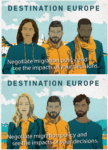
Destination Europe-Learning Tool @ IMISCOE 2021!
Destination Europe is an interactive desktop learning tool based on role-play. It accommodates 4-6 players and makes them experience migration decision-making as a complex process that involves different actors with sometimes conflicting interests. Players consider various migration challenges first at the European Union level and then in their national and city contexts. The tool illustrates real-life impacts policy decisions can have on various categories of migrants and the public in the countries that receive them. For more information on the tool, please refer to the attached flyer.
Download the Destination Europe Flyer

Water and Sea in Word and Image Conference
https://waterandsea2021.uni.lu
waterandsea2020 (@) uni.lu
July 12 – 16, 2021
